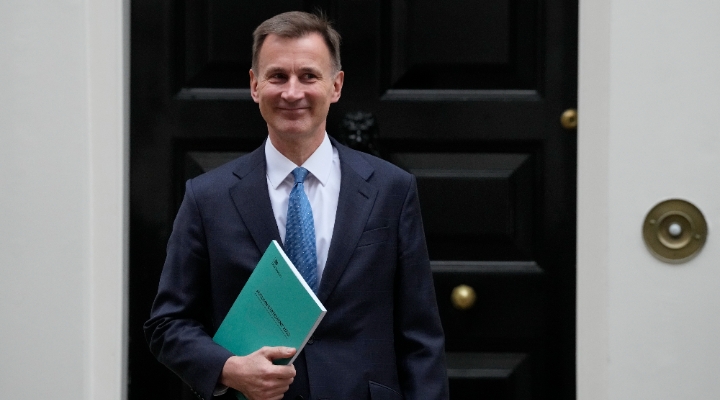.jpg)
Wednesday's Autumn Statement is the last fiscal showpiece of 2023 but not the final opportunity for the government to win over voters before the next general election.
In days gone by, the big reveals would have already been leaked to the media for the Sunday/Monday papers. At the moment we're clutching some vague ideas about changing inheritance tax (IHT), ISAs, and business taxes, but there's confusion over what will land.
Cutting income tax would be a popular but costly move, but weekend interviews suggest the chancellor has cooled on this idea. The idea of reducing the "tax burden", now the highest since the second world war, has been a Conservative "aspiration" for a while. IHT, long regarded as the UK's most hated tax, could be on the table, though even some Tories themselves think it's the wrong moment to give handouts to wealthier families.
As chancellor, Rishi Sunak pledged to cut income taxes by 2029, which now seems a long way off for a party that could be out of power by this time next year. Still, there's more scope for offering tax cuts than at the March 2023 Budget.
Alongside policy updates, we will also get some crucial economic data in the form of the usual fiscal forecasts prepared by the independent Office for Budget Responsibility (OBR).
What's the Background?
Inflation is finally falling, allowing the government to claim it has "halved" inflation as promised. Consumers are still in a very tight spot, with mortgage rates at 15-year highs and no sign yet of rate cuts from the Bank of England (BoE). Taxes are high by historical standards and the "feelgood factor" needed for a government heading into an election is nowhere to be seen.
It's more than a year on from the Truss/Kwarteng "mini-Budget" and there's a sense that calm has been restored. But Sunak and Hunt are still under serious pressure to rescue the Tory party at the polls. Giving people money in the form of tax cuts seems to be simple idea, but hard to execute in practice.
Didn't We Have a Budget in March?
Yes, and technically that was also a "fiscal event" for this year. In personal finance terms, the scrapping of the pensions lifetime allowance (LTA) was a Budget bombshell. As that finally gets phased out in 2024, the effects are yet to be felt.
What Are Experts Saying?
Personal finance commentators have flagged up potential reforms to the ISA regime and adjustments to the state pension "triple lock" formula.
For the former, some are calling for a simplification into one ISA allowance but the government may be considering more complexity.
"The vaunted great ISA shake-up could prove underwhelming," says BestInvest managing director Jason Hollands. He calls for an inflation uplift to the ISA allowance, which is currently £20,000 but would be £25,000 if consumer price index increases are taken into account.
With state pension changes, the government is hoping to pay less to pensioners without losing their votes – a tricky balancing act even after giving them a double-digit rise this year, pushing the average state pension above £10,000 for the first time.
Those who think the housing market has had enough stimulus may be disappointed to hear of yet more proposals to help this sector. There are votes in this, of course, but there were stamp duty cuts during the pandemic which gave the market a small sugar rush. Will first-time buyers be persuaded to vote Conservative? An Autumn Statement might not swing it.
What About Last Year's Autumn Statement?
If you need to pay a capital gains tax (CGT) bill this year or next, or are trying to utilise dividend allowances outside an ISA, you will be aware of the changes made in last year's Autumn Statement. The changes made are still in motion, with the CGT allowance falling to £6,000 this tax year and £3,000 in 2024-2025. The dividend allowance is also being slashed.
This multi-year tax outlook was an unusual move for a chancellor at the time. But the context was unique: Jeremy Hunt needed to convince markets the adults were in charge amid what he is still calling "tough decisions".
A year on, Hunt is unlikely to be reckless with the public finances, but there may be more scope for little "giveaways". Having already tweaked CGT and dividend allowances, he's unlikely to introduce further change. At best, that would seem inconsistent.
When Did the Autumn Statement Become a Big Deal?
March Budgets used to be the "big one", with tax changes and economic forecasts all bundled into a spring announcement that would coincide with the start of the new tax year in April.
By comparison, the autumn event was a minor one in comparison, with tweaks to forecasts but no new tax changes. The emphasis has now shifted, not least because of a sense that repeated crises demand more regular command and control of fiscal policy, alongside all the politics accompanying it.
As a result, the labelling of "Budget" and "Autumn Statement" is confusing, not least for journalists, who now have to be alert twice a year to serious changes in tax and spending.
There do seem to be more of them these days – we had two "fiscal events" in 2017 (March and November), two in 2021 (March and October), two in 2022 (September was unscheduled and we had another one in November) and this year we'll have two. The government can announce changes outside of this schedule too. Who remembers Rishi Sunak's "Plan for Jobs" in July 2020?
The government's official line is: "the Budget is the main fiscal event of the year, where the most significant tax and spending changes are usually included. However, the Chancellor can announce changes to taxes and spending during the Autumn Statement."
The theory is that we're moving towards a minor (spring) and major (autumn) schedule but the semantics are important; the March "Budget" could become the "spring statement" and autumn’s event could be become the "Budget". This kind of uncertaintly is probably not what Philip Hammond envisioned when he attempted to overhaul Budget timing for good way back in 2016.
Ultimately, people don't really care about the when as much as they do the what, but, given the proposals on IHT and the apparent lack of correlation between political posturing and actual economic growth, you might be more tempted to use the word why.
Update: since this story was published, the Financial Times reports Jeremy Hunt is considering a sweeping "Pot For Life" reform to auto-enrolment rules that will "empower" savers to select their own pension arrangements. In theory, this will solve the so-called "small pots" problem, whereby savers switching jobs accumulate potentially dozens of small pension pots throughout their careers, which are then scattered to the four winds and difficult to track down and manage in later life. However, experts – including the former pensions minister Steve Webb – caution that the move will reduce the bargaining power of employers to get good deals for their staff, and could further confuse savers, who originally stood to benefit from default arrangements that didn't require their involvement.







.jpg)
.jpg)
.jpg)


















